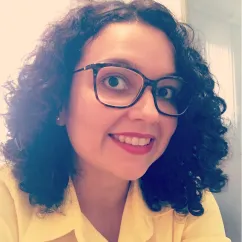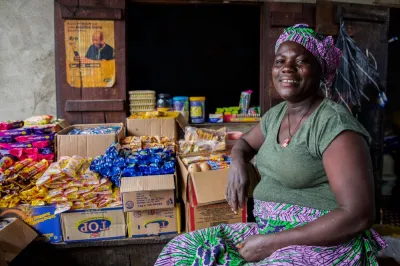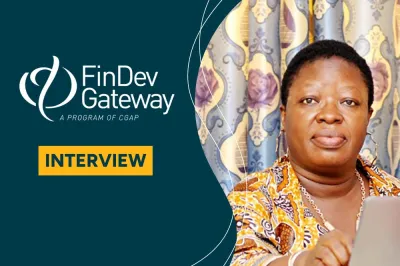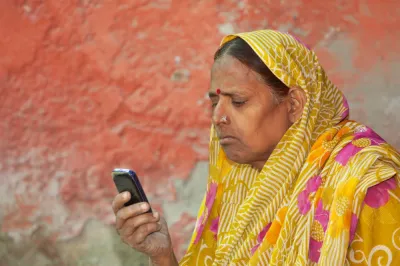Advancing Financial Inclusion for Forcibly Displaced People

Daphnee Iglesias is Policy Officer, Financial Inclusion at International Rescue Committee, as well as Facilitator of the Community of Practice for Financial Inclusion of FDPs. Daphnee holds a Master in Public Policy from the Hertie School (Germany) and is trained in Design Thinking for Social Innovation and Leadership by the United Nations University for Peace (UPEACE). With experience in stakeholder engagement and advocacy for public institutions, non-profits and the private sector in the Americas, Southeast Asia and Western Europe, she has managed portfolios that included financial regulations and data protection, and inclusion and social protection by the use of information technology (ICTs).
FinDev Gateway: To get us started, can you tell us about what drove the need for a community of practice (CoP) on financial inclusion for forcibly displaced persons (FDPs)?
Daphnee Iglesias: FDPs face numerous hurdles in managing their finances, ranging from obtaining the right documents to access financial services, to securing permission to work. These obstacles limit both their income and their opportunities to make longer-term investments.
To bring attention to this topic and the specific barriers FDPs face with financial inclusion, a multistakeholder coalition of actors, including the IRC, launched the Roadmap for Financial Inclusion of FDPs at the Global Refugee Forum in 2019. The Roadmap puts forward six clusters of recommendations on financial inclusion, targeting different actors involved with the provision of financial services and livelihoods for FDPs, including governments, international organizations, nonprofits, private actors and financial service providers (FSPs).
But something was missing to help us translate these recommendations into action. We realized that we needed a space where these stakeholders could meet to discuss challenges and propose new ways of working together to address them. A space that could also inform policy changes at the local, regional or global level. And that is how the Community of Practice on Financial Inclusion for FDPs was born.
Raising awareness and working together to support financial inclusion of forcibly displaced persons
FinDev: What are the key goals for the community of practice?
Daphnee: We also aim to enhance synergies across different stakeholders and sectors, building bridges between donors, the humanitarian sector, financial service providers and regulators, groups who are often not otherwise in communication. For example, our member AFI is facilitating connections between the humanitarian members of the CoP and Central Banks, to help the latter build on humanitarian expertise to implement solutions for FDPs. As part of these efforts, we raise the visibility of existing initiatives and policy changes that support the financial inclusion of FDPs.
We do not act as gatekeepers of knowledge; rather we aim to facilitate understanding among all actors, enabling a safe space for people to meet and build knowledge together through exchange, networking and influencing change.
We work mainly by sharing information and identifying solutions that can be scaled or implemented jointly with different groups of stakeholders. In all our work, we make sure to keep FDPs, including IRC’s own clients, in mind; our efforts need to go to solutions that serve them appropriately. We do not act as gatekeepers of knowledge; rather we aim to facilitate understanding among all actors, enabling a safe space for people to meet and build knowledge together through exchange, networking and influencing change.
Watch FinDev's interview with Daphnee Iglesias:
FinDev: What are some of the most important trends we are seeing lately around financial inclusion for FDPs? What issues does the CoP currently emphasize or wish to explore further?
Daphnee: In general, we are seeing more attention being given to financial inclusion of forcibly displaced persons, a trend which makes me very happy. In particular, there is an increasing recognition of the importance of gender-specific and transformative solutions for financial inclusion. Women affected by displacement face greater economic marginalization and exclusion and are at higher risk of violence.
For the CoP’s focus areas, we are very open to suggestions from our community members, and we also keep an eye out for emergency situations that can change what we had previously set as priorities. Once a year, we define our collaborative action plan based on the areas that the community wants to emphasize for deeper analysis. In 2023, we focused on digitalization, as digital payments, mobile banking and other fintech development can help scale and promote the inclusion of FDPs in the economy.
Climate change is on our lookout. Financial inclusion can also play a role in improving the resilience of climate-affected communities.
Finally, the other priority area we are working on currently is the nexus between humanitarian and development sectors. It is well-known that most FDPs stay at least five years in displacement, so expanding financial support beyond emergency services such as emergency cash transfers is crucial.
For the CoP’s focus areas, we are very open to suggestions from our community members, and we also keep an eye out for emergency situations that can change what we had previously set as priorities.
Joining the Community of Practice on Financial Inclusion for FDPs
FinDev: What are some of the challenges that the COP faces in its work, and how do you believe they can be addressed?
Daphnee: To move the CoP forward, there are some key questions and challenges we must consider, including:
- How can the CoP be most effective in achieving results?
- How are the services and the mandate that we defined going to help the people that are most in need?
- How will our partners, stakeholders and members see value in what we promote, and in the discussions and activities we hold?
- How will we resource the CoP’s continuity? We rely on coordination and active participation of the member organizations, and their ability to participate depends on funding, which can be limited.
We can overcome these challenges by learning and understanding which aspects of the CoP our members value the most and how we can best be of service. Collaboration among all stakeholders is also crucial. We welcome new partners, new members and new ways to flourish and progress our work.
FinDev: Who are the primary stakeholders and organizations engaged in the community of practice, and how can other organizations become involved?
Daphnee: Since the community of practice emerged from the Roadmap for Financial Inclusion, the “founding” members were the stakeholders who had launched the Roadmap: AFI, BTCA, CGAP, ILO, UNHCR and the governments of Germany, UK, Norway and the Netherlands. At that time, the IRC was the only NGO invited to the initiative, and we were financed by the German government to become the CoP’s Secretariat. Since the CoP’s inception in September 2022, we have expanded the network to 26 new members, cutting across different stakeholder groups, and now including other nonprofits, independent consultants, private sector and academia.
It is very simple to join the COP: your organization must endorse the Roadmap and our meeting timeframe, abide by our consensus-based decision-making and demonstrate willingness and commitment in advancing the topic of financial inclusion for FDPs. Please get in touch for an initial, introductory meeting and let’s collaborate! You can reach us at: daphnee.iglesias@rescue.org.



Excellent report. Very informative.
Leave a comment